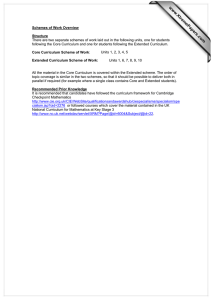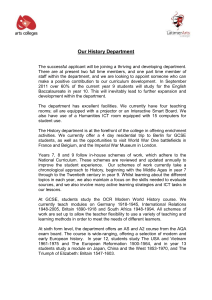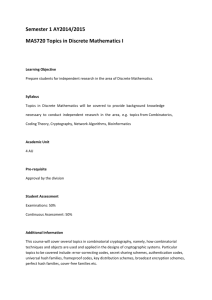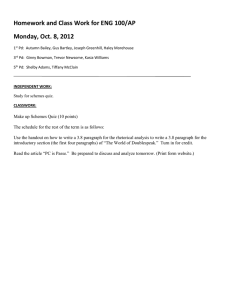Tutorial 9: Schemes of Work Introduction
advertisement
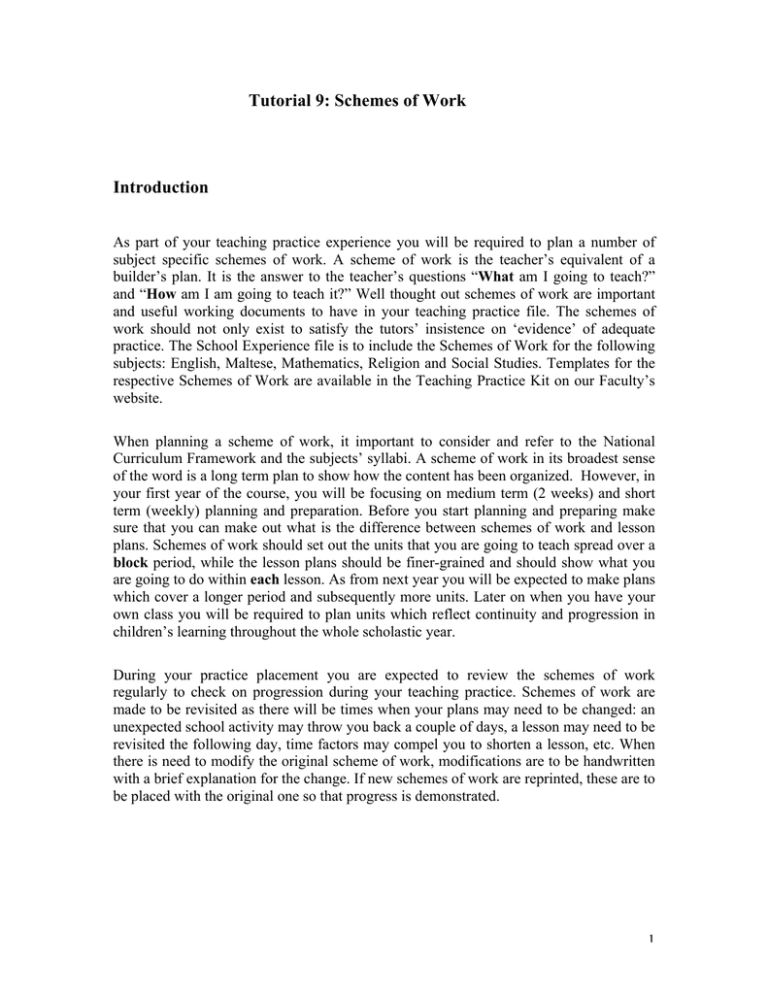
Tutorial 9: Schemes of Work Introduction As part of your teaching practice experience you will be required to plan a number of subject specific schemes of work. A scheme of work is the teacher’s equivalent of a builder’s plan. It is the answer to the teacher’s questions “What am I going to teach?” and “How am I am going to teach it?” Well thought out schemes of work are important and useful working documents to have in your teaching practice file. The schemes of work should not only exist to satisfy the tutors’ insistence on ‘evidence’ of adequate practice. The School Experience file is to include the Schemes of Work for the following subjects: English, Maltese, Mathematics, Religion and Social Studies. Templates for the respective Schemes of Work are available in the Teaching Practice Kit on our Faculty’s website. When planning a scheme of work, it important to consider and refer to the National Curriculum Framework and the subjects’ syllabi. A scheme of work in its broadest sense of the word is a long term plan to show how the content has been organized. However, in your first year of the course, you will be focusing on medium term (2 weeks) and short term (weekly) planning and preparation. Before you start planning and preparing make sure that you can make out what is the difference between schemes of work and lesson plans. Schemes of work should set out the units that you are going to teach spread over a block period, while the lesson plans should be finer-grained and should show what you are going to do within each lesson. As from next year you will be expected to make plans which cover a longer period and subsequently more units. Later on when you have your own class you will be required to plan units which reflect continuity and progression in children’s learning throughout the whole scholastic year. During your practice placement you are expected to review the schemes of work regularly to check on progression during your teaching practice. Schemes of work are made to be revisited as there will be times when your plans may need to be changed: an unexpected school activity may throw you back a couple of days, a lesson may need to be revisited the following day, time factors may compel you to shorten a lesson, etc. When there is need to modify the original scheme of work, modifications are to be handwritten with a brief explanation for the change. If new schemes of work are reprinted, these are to be placed with the original one so that progress is demonstrated. 1 Aims and objectives By the end of this tutorial and observation you should: • • • • Become familiar with the schemes of work templates available in the Department’s Teaching Practice Kit; Be able to fill in the details required for each scheme of work because these vary from one subject to another. Schemes of work should include: a) subject content (e.g. forming comparative and superlative adjectives in English, or position and direction in Mathematics) as well as b) knowledge, skills and understanding (e.g. enabling children to experience investigative approaches in Mathematics) Be able to evaluate the schemes of work of the following subjects: Maltese, English and Mathematics. Be aware of school practices regarding schemes of work. Pre observation tutorial tasks 1. Go through the schemes of work templates available in the Department’s Teaching Practice Kit. Note the similarities and differences between the different subjects. 2. During your next observation ask the class teacher and a member of the administration what are their expectations regarding: a. subjects for which schemes are to be prepared; Ask the teacher if s/he prepares one for all subjects. b. whether schemes of work should be class or year based; Ask the teacher if s/he coordinates with teachers of the same year group or with teachers of younger/older groups. c. time frames to be covered; Ask the teacher if s/he plans long, medium or short term schemes of work. d. the detail required; Ask the teacher what s/he considers to be important to include in a scheme of work (for e.g. time – number and duration of lessons; activities – teacher-talk, pair/group work, practical; resources – books, interactive whiteboard, worksheets, assessment strategies – homework, tests, project work). 2 3. Ask the class teacher if s/he could kindly let you read through or better still give you a copy of his/her language and mathematics schemes of work (or forecasts) for the week in which you will carry out your next observation. Reflect on the details. What details were included? What details were left out? 4. Plan a sample language and mathematics scheme of work for the week in which you will carry out your next observation. Refer to the class teacher’s schemes of work (or forecast) and if necessary prior to this exercise ask him/her to provide you with further details regarding the work to be covered. Use the schemes of work templates available in the Teaching Practice Kit and make sure that you fill in all the necessary ‘cells’. (You may choose to carry out this activity on your own or with your school partner). Post observation tutorial 1. Compare and contrast the sample language and mathematics schemes of work you have planned with the copies or notes you have taken on the schemes of work (or forecasts) planned by the class teacher for the week in which you carried out your last observations. a. b. c. d. e. To what extent do the entries fit in with the theme suggested? Reflect on the balance between knowledge, skills and processes. Is the scheme of work demonstrating sequencing? Are the components logically related to one another? What is your impression regarding the type and use of key resources. Are the resources appropriate to the age and ability of the pupils? Discuss the suitability or otherwise of the key activities. Are the activities linked to the learning they are intended to promote? In this tutorial you have practised how to plan a short term scheme of work. Once the scheme of work has been finalized, it can be used to write lesson plans. Reference Smith, R. (2002). Creating the effective primary school: A guide for school leaders and teachers. New York: Routledge Falmer. 3
